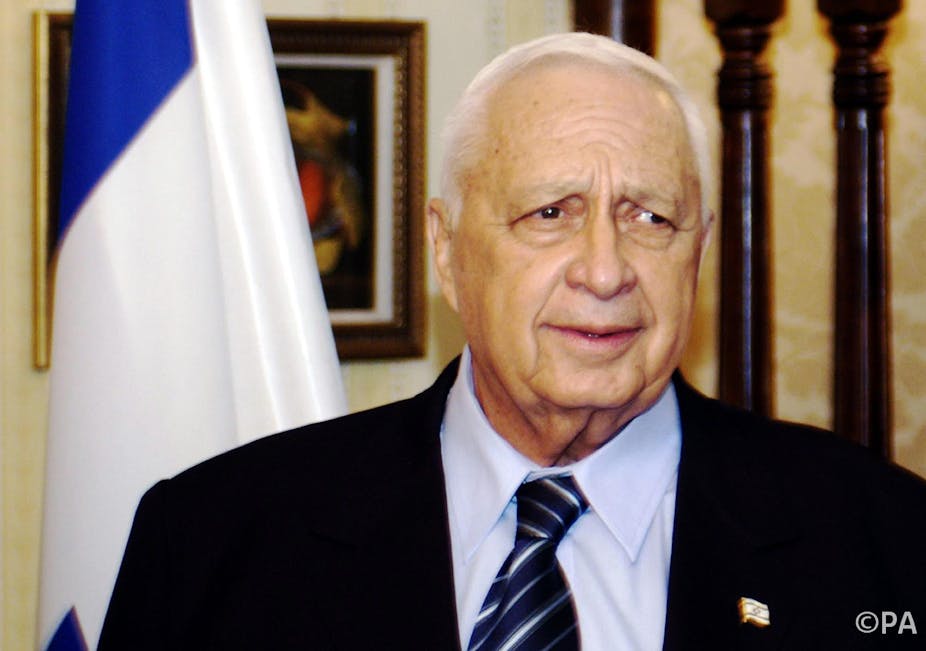Israel is mourning one of its political and military giants. With help from Tony Blair and Joe Biden – but accompanied by a markedly less impressive roll call of world leaders than travelled to South Africa to farewell Nelson Mandela – the country is farewelling a soldier and statesman who has played one of the most important roles in bringing Israel to the position it now finds itself in.
How you see this is very much a matter of perception, and how you feel about Sharon depends very much on who you are. As Israel’s prime minister between 2001 and 2006, Sharon, 85, was a major architect of Israeli militarism who wasn’t afraid to get his boots dirty. As a soldier he had commanded divisions that played a crucial role in the 1967 and 1973 wars. As minister of defence in 1982, he masterminded the invasion of Lebanon, during which Lebanese Christian militias allied to Israel massacred hundreds, arguably thousands, of Palestinians in Beirut refugee camps. Sharon also promoted Jewish settlement in Palestinian Territories and the West Bank barrier.
But in 2005 he ordered the unilateral withdrawal of Israeli troops from the Gaza Strip.
Death, the great leveller
Death ought to be as complicated as the life that precedes it. But instead, it is flattened into starker and more manageable judgements for public consumption.

What a shame that death betrays what are inevitably complex biographies (such as Sharon’s), as it simultaneously provides an opportunity for a summary and a celebration of a life lived. The default position of the dead is “good”.
Sometimes the dead are very good. Witness the heart-wrenching statements by friends and family when a young person, or a victim of violent crime, dies unexpectedly. These heartfelt, and often impromptu, eulogies extol the exemplary qualities of the deceased, offered perhaps as a protest against untimely death: “they didn’t deserve to die”. The implication then is that some people do deserve to die, or deserve to die more than the deceased. But as to who these people are it is never quite clear.
These refrains are familiar fare at funerals. The dead, whatever the life they have lived, are reduced to simple perfection. Their misdemeanours and inconsiderateness are airbrushed; acknowledgement, perhaps, that they have run out of time for self-improvement.
Beatifying Mandela
Repeating this trope, public figures too are often conveyed as “good”. When Mandela died last December, the press and public reaction invoked another Nobel Peace Prize winner in Mother Teresa, who died in 1997 and was subsequently beatified.
Television, radio and newsprint coverage of Mandela, indisputably an important political leader of the ANC and a giant as the first black president of South Africa, expressed only his goodness, his virtual sainthood, his martyrdom as a political prisoner, and his almost holy stance on reconciliation.
This unblemished and simplistic goodness was the only version of Mandela allowed at the time of his death. This is despite the family feuds that surrounded his interment, his will and his legacy; despite the dogged persistence of poverty and racial inequality in South Africa over which he and his successors presided; despite the voices of critics of reconciliation for its superficiality, like Gillian Slovo; and despite the unpopularity and corruption of Jacob Zuma and doubt over whether the ANC can maintain its political credibility in the next election. None of these reservations could be raised at the time.
What could possibly be the problem with a more nuanced portrait of Mandela’s life? Yes, he was an inspiration, but some of his policies didn’t work out so well.
Instead of a nuanced portrait, we are fed a diet of platitudes centred on his life’s more cinematic moments: his backing of the formerly all-white Springboks in the rugby World Cup in 1995, for example. The boundaries between Mandela, Morgan Freeman and now Idris Elba are blurred around this fact-fiction portrait of his goodness.
Thatcher revisited
Margaret Thatcher had an even more controversial political life, and hence death. She did little towards Mandela’s release when she met then South African president PW Botha in 1984 as her papers, released a few days ago, show.

Thatcher, who died last year aged 87, provides the counterpoint to the goodness of Mandela and Mother Teresa, gesturing towards the difficulties that arose around her friendship with the controversial former Chilean leader Augusto Pinochet. This counterpoint will inevitably arise with Sharon this week.
This counterpoint is evil: an equally simplistic assessment of Thatcher’s politics and her legacy. Her contradictory legacy and the emotions prompted by her death were contrasted in “The Witch is Dead” celebrations set against the quasi-state funeral that was held for the prime minister, an honour that no leader since Churchill has had. But this makes for an equally crass analysis. Highlighting her militarism in the Falklands and her handling of de-industrialising Britain would have made for a more powerful and balanced judgement of her premiership.
Sharon can expect the same treatment, the same platitudes from his supporters and caricatures of evil from his detractors. But only when we acknowledge that in death we are as complex and multi-dimensional as we are in life can we expect public commentaries on the dead to be more subtle, realistic and analytical.

